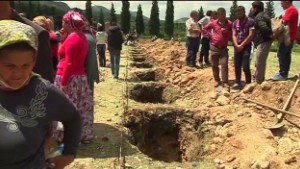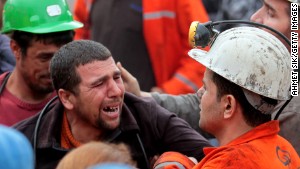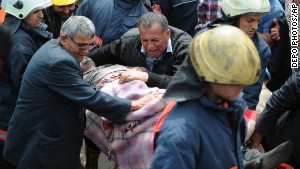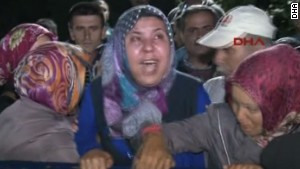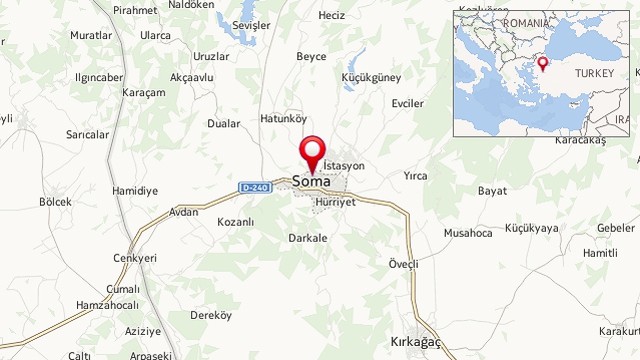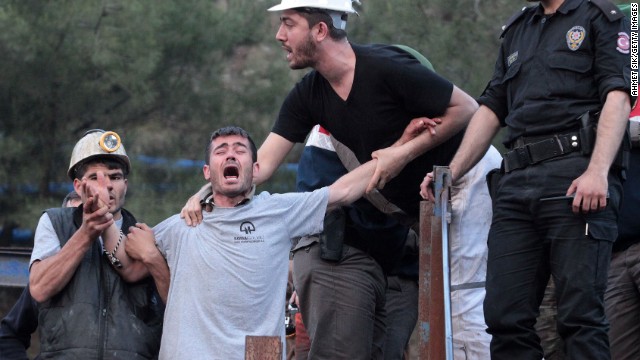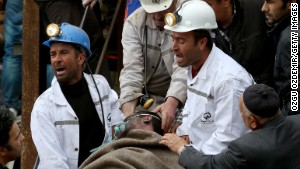Despite Erdogan’s Ruthlessness, Turkey’s Democracy Is Still on Track
Turkish Prime Minister Recep Tayyip Erdogan was once the darling of the international community, but no more. He is still sometimes praised for stewarding Turkey through impressive economic growth, defanging a Turkish military establishment with a long history of meddling in national politics, and initiating a promising peace process with the country’s restive Kurdish population. But Erdogan’s achievements are now shadowed by his undeniable lurch toward autocracy. Over the last year, he has initiated a harsh crackdown against peaceful protesters, political opponents, and independent media outlets. (According to the Committee to Protect Journalists, at one point, the number of journalists jailed in Turkey even exceeded the number in Iran and China.)
The worst developments of all began last December. That was when, in order to quell a perceived threat from an erstwhile ally, the U.S.-based Muslim cleric Fethullah Gülen, Erdogan fired thousands of prosecutors, judges, and policemen, imposed bans on Twitter and YouTube, intensified the government’s already stifling control over the judiciary, and gave the intelligence services more latitude to monitor Turkish citizens. That the Turkish electorate didn’t seem to care much about the heavy-handed repression and the wholesale gutting of judicial institutions added a degree of farce to the tragedy. The Justice and Development Party (AKP), Erdogan’s party, won 43 percent of the vote in the March 28 municipal election, exceeding the 39 percent it received in the previous municipal election, though falling short of the almost 50 percent it won in the last national elections. It all seemed to confirm that, contrary to what many international observers once believed, Turkey was headed away from, not toward, democracy and the rule of law.
But that that would be the wrong way to read this latest chapter of Turkish history. Turkey is in the middle of a difficult process of institutional rebalancing, in which key political and social institutions have been shifting their allegiances away from the military and the large urban-based economic interests that have long dominated Turkish politics. In the absence of independent judicial organizations and an organized civil society, the risk has always been great that any politicians who took power during this turbulent time would abuse it. In other words, Erdogan’s drift from democracy is a lamentable, but almost predictable, stage of Turkey’s democratic transition. If Turkey is to eventually become a democracy, there is no way to avoid the occasionally painful process of making the country’s institutions more inclusive — a process that the country has shown no signs of abandoning.
FROM THE OTTOMANS TO ATATURK
To understand the need for institutional rebalancing, one needs to first understand how the roots of Turkey’s present institutions began in the Ottoman Empire. The reach of the Ottoman state was limited in many ways, but the effective political power that did exist — organized mainly around military conquest and expansion — was concentrated in the hands of a narrow bureaucratic and military elite.
Apart from the elite stood the reaya, meaning “the flock.” As economic actors, these Ottoman subjects had few rights and even fewer options for political participation. Limited private-property rights prevented the emergence of economically independent landholders and merchants. And social institutions were structured so as to minimize constraints on the sultan’s and the central state’s power. Islamic law is supposed to allow for a religious-legal establishment, the ulema, that would constrain rulers. But the Ottoman Empire integrated the ulema into the state bureaucracy. The sultan, then, was also the most powerful representative of religious power.
Despite many attempts at reform during the late nineteenth and twentieth centuries, Turkish rulers’ hold on the bureaucracy and the judiciary never truly relaxed. The reason was simple: the reforms weren’t intended to have that effect. The Ottoman reformers, hailing mostly from the military, were interested not in sharing power with non-elites but in strengthening the state’s existing institutions, domestically and internationally, in the face of financial, economic, and military crises. It is telling that the would-be reformers, from the later infamous Committee for Union and Progress, who organized a watershed uprising against the sultan in 1908, didn’t make a serious attempt to co-opt an existing grassroots movement opposed to the government, but instead relied on backers in the military. Once in power, these “revolutionaries” immediately turned against anyone who they thought opposed them.
The Turkish Republic was officially founded in 1923, by another group of young military officers, with Mustafa Kemal (later called Atatürk, “the great Turk”) at the helm. The Turkish Republic marked a more radical departure from the Ottoman Empire. The new rulers abolished the monarchy, modernized state bureaucracy, regulated religion, which they saw as an obstacle to their plans, and intended to industrialize Turkey. But one aspect of the Ottoman order was never challenged: state institutions and the bureaucracy remained under the command of the ruling elite, now the upper cadre of Atatürk’s Republican People’s Party (CHP). Once again, the elite felt that there was little need for broad-based support. In fact, Atatürk’s reforms were intended to be imposed forcefully on a population that was presumed, rightly, to be opposed to many of them.
The military and political dominance of the CHP, and the party’s willingness to use robust force if necessary, allowed the Kemalist project to succeed under one-party rule until the end of World War II. But cracks were appearing. In 1946, the Democratic Party (DP) was founded by former members of the CHP, who hoped to benefit from public discontent over the CHP’s heavy-handed rule. In 1950, when the DP swept to power with a landslide election victory, many of its deputies, and certainly its supporters, hailed from provincial cities and rural areas and had backgrounds in small-scale commerce outside the purview of the state. (This contrasted with the bureaucratic or military background of the majority of the CHP deputies.)
THE AKP REVOLUTION
On May 27, 1960, Turkey woke up to the first of many military coups, putting an end to its nascent experiment with democracy. The military swiftly moved to hang Adnan Menderes, the leader of the DP.
The next 40 years brought many new political actors to the Turkish scene, including a panoply of leftist groups bent on the overthrow of the state. But the divide between the more statist CHP and the more religious parties (which picked up the DP’s mantle) remained a constant, even as the latter agreed to work with the military and generally refrained from challenging the core precepts of the Kemalist state (and, in some instances, forged even better ties with existing business elites).
It was the AKP that most faithfully, and effectively, copied the DP’s formula of religious populism mixed with free-market economics. When the AKP emerged victorious in the 2002 parliamentary elections, the battle lines with the Kemalist elite were already drawn. In April 2007, after the party gained control of the presidency, the military — which had moved against three other elected governments between 1960 and 2002 — posted a memorandum on its website threatening a coup against the AKP government. Ominously, the Constitutional Court started proceedings to shut down the AKP, because its religious outlook was allegedly in violation of Atatürk’s constitution.
But 2007 was not 1960. It wasn’t just that the AKP had deeper social networks, especially in municipalities run by its predecessor, the Welfare Party. It had also taken control of large parts of the bureaucracy and the police. Meanwhile, the military’s status within Turkish society was at an all-time low. This time, the Kemalists lost, in part because the Turkish public refused to abide the generals’ meddling. Power had successfully shifted away from Kemalist elite to a party with support from the majority of Turks, including much of the population of provincial cities and the rural heartland.
But in terms of building a true democracy, it was never going to be enough to simply loosen the Kemalist elite’s grip on existing state institutions. The institutions themselves needed to become more inclusive. Unfortunately, the AKP — in the absence of any concerted pressure from Turkey’s still feeble civil society — concentrated instead on building a political monopoly of its own. Rather than strengthening independent institutions, AKP elites set out to seize control of the state bureaucracy, the police, and the judiciary, and then tried to use those institutions for the party’s own ends. This mimicked the pattern of political development in many postcolonial societies, where new political leaders swiftly seized decisive control of the state after the colonial powers departed in a hurry. And, like those predecessors, Erdogan has not shied from flaunting his power.
Far from trying to overcome the polarization of the Kemalist era, Erdogan has cleverly decided to tap into it. He has declared that Turkey is still in the midst of an existential struggle between Black Turks (the disempowered, less educated, more conservative masses) and White Turks (the Kemalist, educated, Westernized elites). “Your brother Tayyip,” he has declared, “belongs to the Black Turks.”
The problem with this rhetoric is that, because it is half true, it resonates with the public and polarizes it further. This became quite clear last summer, when Erdogan successfully masked his repression of peaceful protests as a necessary step in the struggle of Black Turks against White Turks, and then again during this year’s municipal elections. In each instance, the strategy paid off for the AKP, not only because it cemented Erdogan’s popularity among his core supporters but also because the rhetoric became self-fulfilling. The outcome is that Turkey’s state and civil institutions, caught in this seemingly existential standoff, have failed to become any more inclusive.
NO TURNING BACK
Despite creeping authoritarianism and polarization in Turkish politics, one shouldn’t despair. From a democratic perspective, things were worse under the Kemalist elite (especially after the 1980 military coup), when Turkish society was largely depoliticized. Facing military rule allied with big business, most potential opposition forces offered no resistance. The AKP is in the midst of a very different situation today. Indeed, the party planted the seeds of its own undoing when it mobilized Turkish civil society in its initial rise to power. Even Erdogan, in his early years in government, encouraged open dialogue in society, if only to obliterate some of the red lines (on Kurds, minorities, the role of the military in society, and religious freedom, at least for his Sunni supporters) previously imposed by the Kemalist elite.
The AKP can try to mimic its Kemalist predecessors, but Turkish society is unlikely to be as pliant as it was in earlier years. Not only is the country’s urban youth more liberal, more independent, and more informed than ever before — Turkey is among the top users of both Facebook and Twitter — but also, the protests last summer made clear, it is thirstier for political participation and democracy. The judiciary, taking its cues from Turkey’s newly awakening civil society, is also no longer content to be a pushover. The Constitutional Court has struck down some of the AKP’s more repressive laws and decrees. It is important to note that, in making these interventions, the Constitutional Court has not been speaking on behalf of the military-bureaucratic elite (as was its role under the CHP), but for a broader segment of the population, and thus for the rule of law and inclusive political institutions.
Although Erdogan’s support among the urban and rural poor and large segments of the middle class seems solid today, it is predicated on continued economic growth and the delivery of public services to the underprivileged. Erdogan’s joy ride is over if the economy heads south (and it could — Turkey’s growth over the past six years has depended on unsustainable levels of domestic consumption and trade deficits). In that case, the opposition is likely to broaden and, having learned from experience with the AKP, will eventually begin to demand institutions that fairly represent the country as a whole.
This is not to suggest that the recent slide in Turkish governance should be viewed through rose-colored glasses. The AKP continues to repress any opposition and will surely try to gag the Constitutional Court. But the party’s efforts to monopolize power should not surprise in historical context. More than 50 years on, the process of building inclusive political institutions in many postcolonial societies is still ongoing. And it took France more than 80 years to build the Third Republic after the collapse of the monarchy in 1789.
Institutional rebalancing was never going to be a painless, easy process. For the AKP to eventually fail in its attempts to monopolize power, ordinary people and civil society will have to protest loudly. Politics has long been an elite sport in Turkey, and the elite — whether military, bureaucratic, big business, or the AKP — have looked after their own interests, not the people’s. This will change only when politics encompasses a broader segment of society. The silver lining to the current trouble is that Turkey has already taken some important steps toward doing just that.

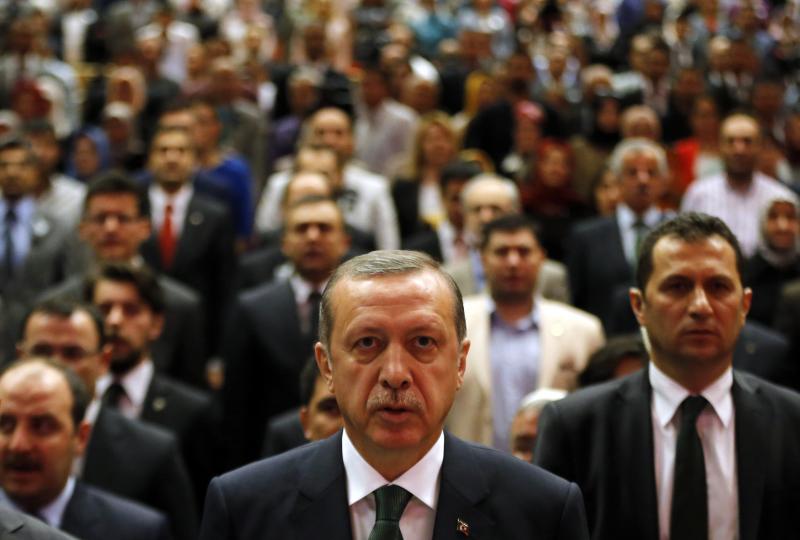

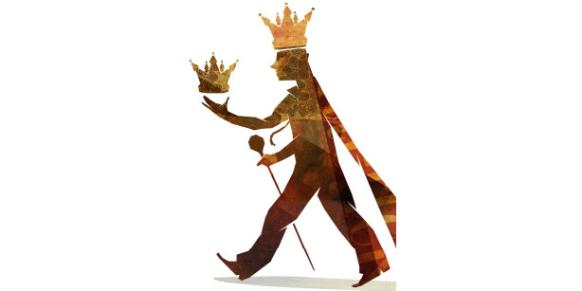
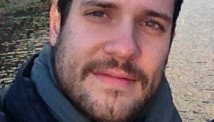
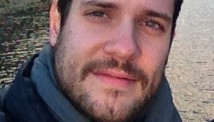
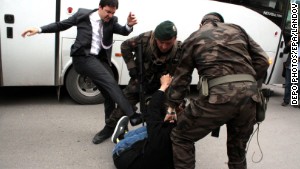
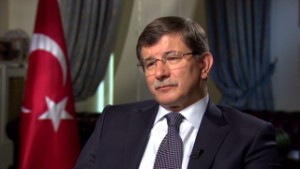
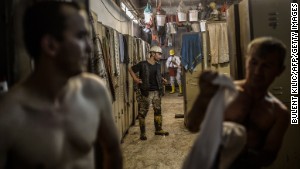
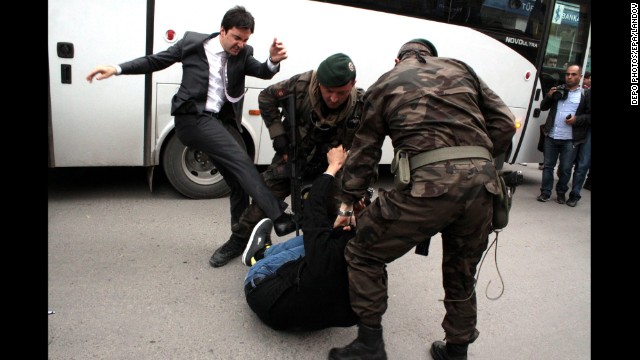

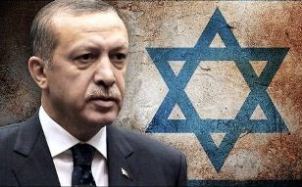
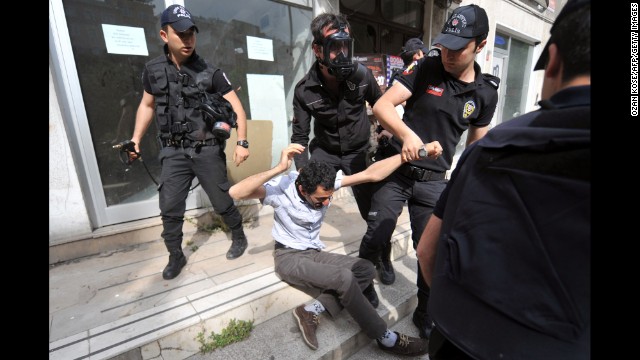
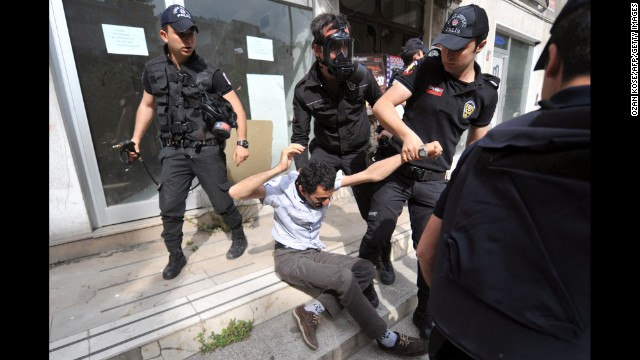 A protester is detained in front of the General Directorate of Mineral Research and Exploration headquarters in Istanbul on May 14.
A protester is detained in front of the General Directorate of Mineral Research and Exploration headquarters in Istanbul on May 14.